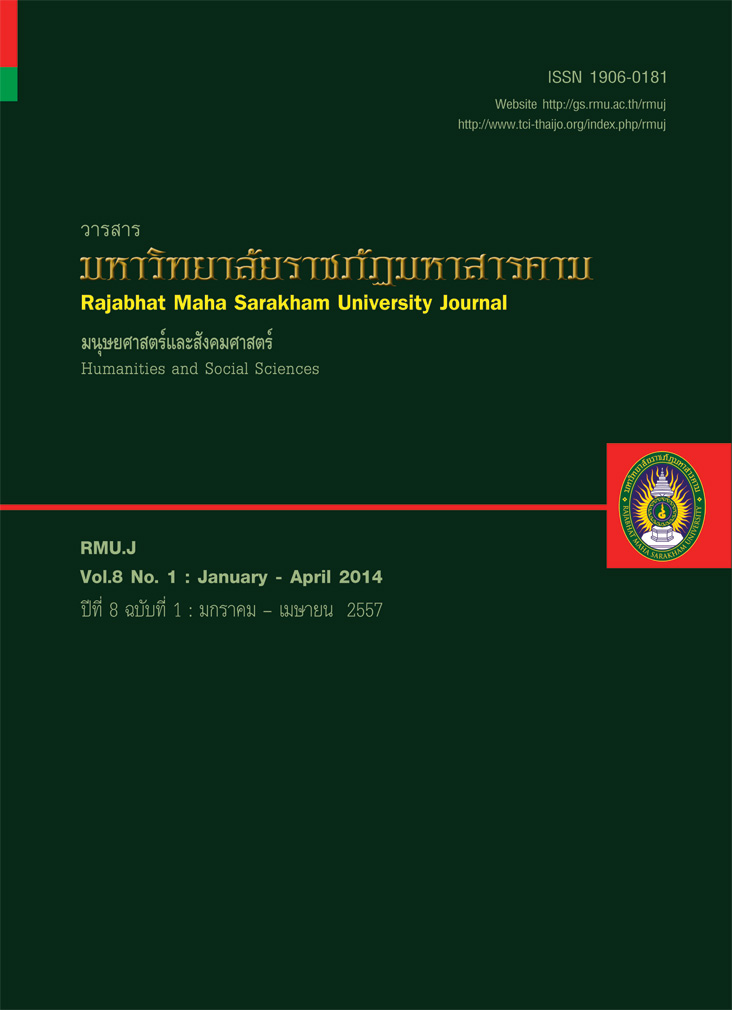รูปแบบการเสริมสร้างความเข้มแข็งกลุ่มทอผ้าไหมตำบลกุดรัง อำเภอกุดรัง จังหวัดมหาสารคาม The Development of Strengthened Management Model of Kud Rang Silk Weaving Group, Kud Rang District, Maha Sarakham Province
Main Article Content
บทคัดย่อ
การวิจัยนี้มีวัตถุประสงค์เพื่อศึกษาและพัฒนารูปแบบการเสริมสร้างความเข้มแข็งกลุ่มทอผ้าไหมตำบลกุดรัง อำเภอกุดรัง จังหวัด
มหาสารคาม แนวคิดของการวิจัย ประกอบด้วย บริบทชุมชนตำบลกุดรัง ศักยภาพด้านการบริหารจัดการ แนวทางเพิ่มศักยภาพด้าน
การบริหารจัดการ แนวทางความร่วมมือของกลุ่มทอผ้าไหม และปัจจัยที่ทำให้กลุ่มทอผ้าไหมสามารถพัฒนาแนวทางการเพิ่มศักยภาพ
และความร่วมมือ กลุ่มผู้ให้ข้อมูลประกอบด้วย สมาชิกกลุ่มทอผ้าไหมในตำบลกุดรัง กลุ่มภูมิปัญญาท้องถิ่น ได้แก่ ผู้นำชุมชน ผู้ทรง
ภูมิปัญญาในท้องถิ่น พระสงฆ์ ตัวแทนครู ตัวแทนชาวบ้าน นักวิชาการจากหน่วยงานสนับสนุน และนักวิชาการจากสถาบันการศึกษา
รวมจำนวน 45 คน การวิจัยครั้งนี้เป็นการวิจัยแบบมีส่วนร่วม (PAR : Participatory action research) ในพื้นที่ศึกษา โดยมีคณะ
ผู้วิจัยและประชากรเป้าหมายเข้ามามีส่วนร่วมในการศึกษา ดำเนินการและติดตามประเมินผล การวิเคราะห์ข้อมูลใช้วิธีการวิเคราะห์
เนื้อหา (Content analysis) แล้วนำเสนอข้อมูลเชิงพรรณนา ผลการวิจัยพบว่า
รูปแบบการเสริมสร้างความเข้มแข็งกลุ่มทอผ้าไหม ตำบลกุดรัง อำเภอกุดรัง จังหวัดมหาสารคาม มีดังนี้
1. สมาชิก การดำรงอยู่ของกลุ่มทอผ้าไหมกุดรังจึงขึ้นอยู่กับสมาชิกเป็นสำคัญ ดังนั้น 1.1) สมาชิกจะต้องเข้าใจบทบาทหน้าที่
ของตนเอง 1.2) สมาชิกจะต้องมีวินัยต่อตนเองทั้งในการออมเงินและการจ่าย 1.3) ยึดหลักปรัชญาเศรษฐกิจพอเพียงในการดำรงชีวิต
1.4) ต้องคัดเลือกบุคคลที่มีทักษะ ความรู้ ความสามารถและความชำนาญเข้ามาปฏิบัติหน้าที่ 1.5) ต้องปฏิบัติงานตามหน้าที่ที่รับผิด
ชอบด้วยความซื่อสัตย์ สุจริต และ 1.6) ดูแลและใช้สินทรัพย์ต่างๆ ของกลุ่มทอผ้าไหมกุดรังอย่างเหมาะสม คุ้มค่า และเกิดประโยชน์
ต่อสมาชิก
2. คณะกรรมการดำเนินการกลุ่มทอผ้าไหมกุดรัง จะต้อง 2.1) มีความรับผิดชอบในการบริหารจัดการและดำเนินการ 2.2) ต้อง
ปฏบิ ัติงานดว้ ยความโปรง่ ใส ซื่อสตั ยส์ ุจรติ เปน็ ที่เชื่อถือศรัทธาแกส่ มาชิก 2.3) มรี ะบบการควบคมุ ภายในที่ดีและเพียงพอตอ่ การปฏบิ ตั ิ
งานด้านต่างๆ 2.4) รู้จักใช้ข้อมูลทางบัญชีในการบริหารงานเพื่อช่วยในการตัดสินใจ และ 2.5) หมั่นศึกษาหาความรู้เพิ่มเติม เพื่อให้การบริหารงานมีประสิทธิภาพ
This research is aimed at studying and developing the strengthened management model of Kud Rang
silk weaving group, Kud Rang district, Maha Sarakham Province. The conceptual framework consisted of the
community context of Kud Rang district, the management capabilities, guidelines of enhancing management
capabilities, guideline of the cooperation of Kud Rang silk weaving group, and factors enhancing management
capabilities and developing the cooperation. Data sources consisted of Kud Rang silk weaving group
members, and folk wisdom groups, including community leaders, local experts, Buddhist monks, the teacher
representatives, the villager representatives, the academician from supporting organization, and the academician
from educational organization which were 45 persons in total. The research was the participatory action research.
The researchers and the target population participated in the study; operated, monitored and evaluated the study.
The data was analyzed through content analysis, and then presented through data description.
The strengthened management models of Kud Rang silk weaving group, Kud Rang district, Maha
Sarakham Province were as follows:
1. The existence of Kud Rang silk weaving group importantly depended on group members. Therefore,
the group members must: 1) understand their own role, 2) be self-disciplined in saving and paying money,
3) follow sufficiency economy philosophy, 4) select anyone who has skills, knowledge, abilities and professionals
to operate the group, 5) work based on integrity and honesty, and 6) maintain the assets to be appropriate,
worthy and valuable for the group members.
2. The committee of the Kud Rang silk weaving group are required to: 1) be responsible for management
and operation, 2) work with transparency, honesty and be trustworthy among members, 3) set good system
of internal control and adequate for operational aspects, 4) use the accounting information for management
and decision-making, and 5) regularly learn more knowledge for efficient management.
Article Details
1. บทความที่ลงตีพิมพ์ทุกเรื่องได้รับการตรวจทางวิชาการโดยผู้ประเมินอิสระ ผู้ทรงคุณวุฒิ (Peer Review) สาขาที่เกี่ยวข้อง อย่างน้อย 3 ท่าน ในรูปแบบ Double blind review
2. ข้อคิดเห็นใด ๆ ของบทความที่ลงตีพิมพ์ในวารสารมหาวิทยาลัยราชภัฏมหาสารคาม นี้เป็นของผู้เขียน คณะผู้จัดทำวารสารไม่จำเป็นต้องเห็นด้วย
3. กองบรรณาธิการวารสารมหาวิทยาลัยราชภัฏมหาสารคาม ไม่สงวนสิทธิ์การคัดลอกแต่ให้อ้างอิงแสดงที่มา


